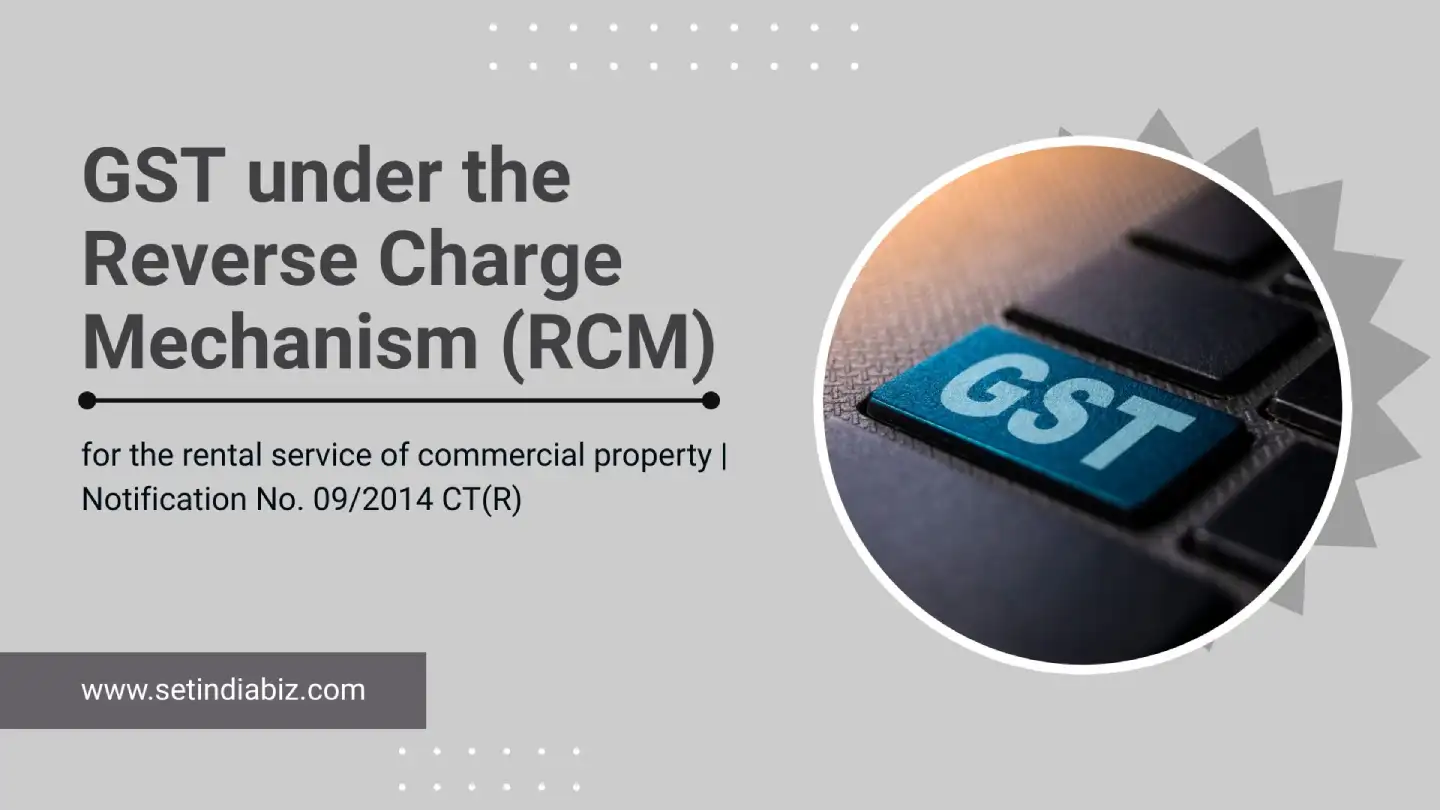GST under the Reverse Charge Mechanism (RCM) for the rental service of commercial property | Notification No. 09/2014 CT(R)
Overview : The Goods and Services Tax (GST) is a comprehensive legislation that indirectly levies a tax on the supply of goods and services in India. The Notification No. 09/2024 – Central Tax (Rate), effective from 10.10.2024, introduces significant changes to the RCM treatment for renting properties, specifically targeting commercial properties leased or rented by unregistered persons to registered persons. In this blog, we will deal with the impact of the notification in detail.
Forward Charge vs. Reverse Charge
In the Goods and Services Tax (GST) system, the forward charge is the standard method of tax collection where the supplier of goods or services is responsible for charging GST to the recipient and depositing it with the government. This is the most common scenario in GST transactions. In contrast, the reverse charge mechanism (RCM) shifts the liability to pay GST from the supplier to the recipient of the goods or services. RCM is applied in specific situations outlined in Section 9(3) and 9(4) of the CGST Act and Section 5(3) and 5(4) of the IGST Act, such as when the supplier is unregistered, in transactions between related parties, or for specific categories of goods and services.
For example, Notification No. 13/2017 outlines various services, such as Goods Transport Agency, Advocate, Arbitrator, etc., for which the recipient is liable to pay GST under RCM. The application of RCM aims to improve compliance and prevent revenue leakage by ensuring that GST is collected even when the supplier is outside the tax net.

Renting of Commercial Properties
Before Notification No. 9/2024, the responsibility to pay GST on renting commercial property in general rests with the landlord or commercial property owner, the rental service supplier. The collection of the GST and depositing the same with the GST department is the general taxation scheme that was prevalent concerning commercial leasing before the aforesaid notification.
The old position was as under
- Threshold Limit: If the supplier (landlord of commercial property) turnover exceeds the threshold limit for GST registration, they must register and pay GST on the rental income under the forward charge mechanism. This means the supplier was responsible for charging the tenant GST and depositing it with the government.
- Unregistered Suppliers: If the supplier was unregistered (e.g., a small landlord with turnover below the threshold), they were not required to charge GST on the rent.
- RCM Not Applicable in Most Cases: Although RCM is a mechanism within GST, it was not generally applied to the renting of commercial properties before Notification No. 9/2024,
Impact of Notification No. 9/2024 – New Position
Notification No. 09/2024 – Central Tax (Rate), effective from 10.10.2024, introduces significant changes to the RCM treatment for renting properties, specifically targeting commercial properties rented by unregistered persons to registered persons
Renting of Commercial Properties:
- The notification extends the application of RCM to the renting of any property other than a residential property when supplied by an unregistered person to a registered person. This implies that registered businesses renting commercial spaces from unregistered landlords will now be liable to pay GST under the reverse charge mechanism (RCM).
- Objective: This amendment brought about by the said notification No 09/2024 CT(R) is to prevent revenue leakage by bringing the commercial rents under the purview of GST in all cases.
Application of the Notification
The notification is all about renting out service of commercial premises, especially where the landlord or the property owner is not registered under the GST. For example, Mr Rajeev let out his commercial space to a company (GST Registered tenant or recipient of rental services) at a monthly rent of ₹15,000; the following two situations emerge.
- The landlord, Mr Rajeev, is registered under GST. When a landlord is registered for GST, he will issue a tax invoice that includes an additional 18% GST on top of the rental service value. Notification No. 09/2024 will not affect this type of rental arrangement. For example, if the rental service amount is ₹15,000, the landlord will issue a tax invoice for that amount along with an additional GST charge of ₹2,700. As a result, the tenant will not be liable for a reverse charge of GST.
- Unregistered Landlord: In a situation where the tenant is registered under GST but the landlord or owner of the premises is not registered, Notification Number 9 of 2014 will apply. Under this notification, the tenant is required to pay GST on the rental services received from the unregistered landlord through a Reverse Charge Mechanism (RCM). Please note that this notification will come into effect on October 10, 2024. To illustrate, let’s consider an example: If the landlord, Mr Rajeev, is unregistered under GST, he will issue a rental bill of ₹15,000 without including any GST in his rental demand. The GST-registered tenant will pay the landlord ₹15,000 and will also be responsible for paying GST on the rental value via RCM. The tenant will make two payments: one to the landlord and the other to the GST department for the applicable GST amount.
- Claim of input: In both the cases illustrated above, the tenant shall take advantage of input tax credit (ITC) for the GST Paid to the landlord under the forward charge mechanism or the GST paid on RCM.
Conclusion
The Notification No. 9/2024 marks a significant shift in the GST regime for commercial rental properties in India. The blog explains the impact of notification number 09 of 2024 on the rentals of commercial properties. The tenant needs to understand in which situation they have to pay GST on the Reverse Charge Mechanism. Team Sentindiabiz is available to assist.